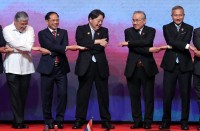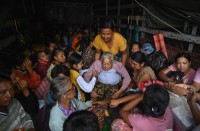
(Reuters) — Human Rights Watch says they hope to see countries from the Association of Southeast Asia Nations (ASEAN) push towards a resolution of Myanmar’s Rohingya crisis, when they meet in Yangon on Monday (December 19).
Myanmar has called an emergency meeting of ASEAN foreign ministers to discuss the Rohingya crisis, just three days after the United Nations said it was getting daily reports of rapes and killings of the Rohingya minority in Myanmar, but said the government was insultingly dismissing the claims and making the situation worse.
The UN statement which was released on Friday (December 16) said that the government, led by Nobel Peace Prize winner Aung San Suu Kyi, had taken a “short-sighted, counterproductive, even callous” approach to the crisis, which could have grave long-term repercussions for the region.
The United Nations has estimated 27,000 members of the largely stateless Rohingya minority have fled across the border to Bangladesh.
Hundreds of thousands of Muslim Rohingyas continue to live in apartheid-like conditions at an Internal Displaced People’s camp in Sittwe, the capital of Rakhine state, since the sectarian violence that killed hundreds in western Rakhine in 2012.
“We cannot travel to anywhere, no education or healthcare, no job here. We are living here like prisoners. So, I have no more words to express our lives. We need many help as much as possible.” said Maung Hla, a Rohingya Muslim living in a camp in Sittwe, Myanmar.
The persecution of the Rohingyas in Rakhine state, has also forced hundreds of thousands to board flimsy boats and flee to neighbouring countries including Malaysia, Thailand and Indonesia which, along with Myanmar, are all members of ASEAN.
People in both Malaysia and Indonesia have been protesting against the violent crackdown on Rohingya Muslim in northern Rakhine States.
Malaysia’s Prime Minister Najib Razak has urged international intervention to stop ‘genocide’ the Rohingya.
The move was a rarity among Southeast Asian nations, who adhere to a policy of non-interference in each other’s domestic affairs.
Human Rights Watch (HRW) hoped to see the allies pushing forward to the solutions in Monday’s meeting.
“We’re hoping that this will be the beginning of an ongoing campaign by some of the ASEAN states to demand answers from Burma and to expect better treatment of the Rohingya. If it’s just a one off meeting when they go, listen to Aung San Suu Kyi and merrily go home, satisfied with her answers, I think that we will not see any improvement in the situation. What is clear however, ASEAN does have efficacy to be able to force Myanmar to answer questions,” Phil Robertson, deputy director of the Asia Division at HRW said.
“The larger issue is whether this is going to contribute to a solution in the long term for the Rohingya. Ultimately these governments need to press Burma to allow the Rohingya to stay and to have citizenship and be accepted as full participants in the Burmese state. Otherwise, we’re going to continue to have these occasional pogroms against the Rohingyas, the Rohingya being forced to fee to Bangladesh and into boats. It will continue to be a regional problem that we saw two years ago,” said Robertson.
The pressure on the government of Nobel Peace Prize laureate Aung San Suu Kyi over the crisis in the northwestern state is growing and the United Nations has called on Suu Kyi to go to the state to reassure civilians they will be protected.
The meeting on Monday will be a closed door meeting attend by foreign ministers of 10 ASEAN countries.







